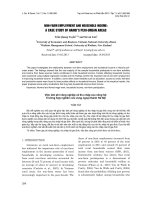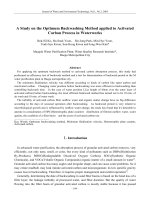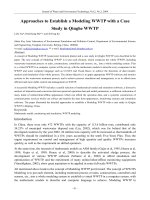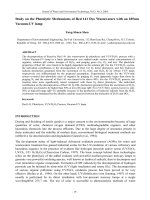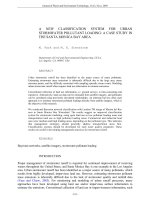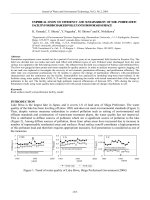Plastic report study summary
Bạn đang xem bản rút gọn của tài liệu. Xem và tải ngay bản đầy đủ của tài liệu tại đây (393.9 KB, 8 trang )
STUDY TEAM
IFTEKHAR ENAYETULLAH
A.H.MD.MAQSOOD SINHA
IJAZ HOSSAIN
SIRAJUL ISLAM
KAMRUL HASAN KHAN
LAILA ARJUMAN BANU
MD.MOSTAFIZUR RAHMAN
SHYAMAL KUMAR ROY
Waste Management Expert
Waste Management Expert
Techno-Economic Expert
Polymer Expert
Socio-Economic Specialist
Chemical Engineer
Data Analyst
Environmental Engineer
TABLE OF CONTENTS
STUDY TEAM
EXECUTIVE SUMMARY
GLOSSARY
ABBREVIATIONS
TABLE OF CONTENTS
LIST OF TABLES
LIST OF FIGURES
LIST OF PLATES
CHAPTER1
1.1
1.2
1.3
Background
Objectives of Study
Methodology
1.3.1 House to House Survey
1.3.2 Secondary Collection Point Survey
1.3.3 Dumpsite Survey
1.3.4 Questionnaire Survey
CHAPTER 2
2.1
2.2
2.3
2.4
2.5
2.6
2.7
3.4
3.5
SOLID WASTE GENERATION SCENARIO OF DHAKA CITY
Organizational, Financial and Legal Aspects
Quantity of Solid Waste
Physical Composition of Solid Waste
Type of Plastic Waste Disposed in Dhaka
Types of Plastic Waste Disposed and Sold By Households in DCC Area
Average Consumption of Plastic in Dhaka City
Growth of Plastic Waste Over Last Ten Years in Dhaka
CHAPTER 3
3.1
3.2
3.3
INTRODUCTION
PLASTIC WASTE RECYCLING SCENARIO OF DHAKA CITY
Methodology
Plastic Waste Recycling System in Dhaka City
Recycling Trade Chain
3.3.1 Feriwallas
3.3.2 Van Collectors
3.3.3 Wastebin tokais
3.3.4 DCC Collectors
3.3.5 Dump site Tokai
3.3.6 Vangari dokan
3.3.7
Brokers
3.3.8 Wholesalers
3.3.9 Manufacturers
Total Amount of Plastic Waste Recycled in Dhaka City
Employment Generated by Plastic Waste Recycling in Dhaka
1
1
1
2
3
3
4
4
6
6
6
8
9
11
12
13
14
14
14
15
15
17
19
21
22
23
25
26
28
29
31
CHAPTER 4
TECHNOLOGY USED FOR RECYCLING OF
PLASTIC WASTE
32
4.1
32
Brief Introduction to Plastics
4.2
Mechanical Recycling Process
4.2.1 Collection
4.2.2 Cleaning and Drying
4.2.3 Sorting
4.2.4 Size Reduction
32
33
33
33
34
4.3
Recycling of Post Consumer Polypropylene (PP)
4.3.1 PP Container Making Factory
Recycling of Post Consumer PVC Flexible Tubes/Pipes
Recycling of Post Consumer HDPE and LDPE
4.5.1
Recycling of Post Consumer HDPE Containers
4.5.2
HDPE Pellet Making Factory
4.5.3
HDPE Pellet and Bodna Making Integrated Factory
4.5.4
HDPE Jerry Can Making Factory
4.5.5 Recycling of Post Consumer LDPE Films
4.5.6 Clean Post Consumer PE Film Factory
4.5.7 Sandal Factory Using Clean Post Consumer PE pellets
4.5.8 Contaminated Post Consumer PE Film Factory
4.5.9 Small-Container Making Factory
Recycling of Post Consumer PET Bottles and Containers
Mixed Contaminated Waste Plastics
36
36
38
40
40
40
41
41
44
44
45
45
50
50
50
4.4
4.5
4.6
4.7
CHAPTER 5
5.1
5.2
5.3
5.4
5.5
5.6
5.5.75
5.7
5.8
5.9
Introduction
Recycling- Developed vs. Developing Country
Costs of Different Stages of the Collection Chain
Plastics Processing Costs for Recycled and Virgin Resins
Market Analysis of Recycled Plastics
Profitability of Plastics Recycling
Economic Impact of Plastics Recycling
Factors Affecting Plastics Recycling
Export Potential of Recycled Plastic Pellets
CHAPTER 6
6.1
6.2
ECONOMICS OF PLASTIC RECYCLING
CONCLUSION AND RECOMMENDATION
53
53
53
55
55
58
58
61
62
63
65
Key Findings
Recommendations
6.2.1 Promotion of Environmental Management System (EMS) In the Plastic
Industry
6.2.2. Awareness Campaign for Source Separation of Plastic Waste from Other
Municipal Waste
6.2.3
Pilot Intervention for Collection of Source Separated Plastic Waste in One
Residential Area of Dhaka City
6.2.4. Capacity Building Training Programs and Policy Intervention for Efficient
Plastic Waste Recycling in Bangladesh
65
65
65
REFERENCES
ANNEX I QUESTIONNAIRES
ANNEX II LEGISLATIONS ON RECYCLING OF PLASTIC
ANNEX III GOVERNMENT CIRCULARS
68
69
75
79
66
66
67
LIST OF TABLES
Table
Title
Page
Table 2.1
Table 2.2
Table 2.3
Table 2.4
Table 2.5
Table 2.6
Table 2.7
Domestic Waste Generation Rate of DCC Area
Average Domestic Waste Generation Rate in DCC Area
Average Waste Generation Rate of DCC Area
Total Waste Generated in DCC Area
Comparative Results of Composition of Solid Waste of DCC Area
Types of Plastic Disposed by Households in DCC Area
Type and Amount of Plastic Sold/Disposed By Households of High Income
Group
Type and Amount of Plastic Sold/Disposed By Households of Middle Income
Group
Type and Amount of Plastic Sold/Disposed By Households of Low Income
Group
Estimated Amount of Plastic Consumed By Different Income Groups in Dhaka
Average Domestic Waste Generation Rate in DCC Area
Growth of Plastic Waste in DCC Area
Amount of Plastic Waste Purchased by a Feriwalla
Price of Collected Plastic Per Kg
Amount of Plastic Collected by Van Collectors
Waste Collection Sources of Van Collectors
Sale Price of Collected Plastic (per kg) by the Van Collectors
Amount of Plastic Collected by Wastebin Tokai
Source of Plastic Collection by Wastebin Tokai
Table Price of Collected Plastic (per kg)
To Whom Collected Plastic Is Sold by the Dustbin Tokais
Amount of Plastic Collected by DCC Collector
Source of Plastic Waste Collection by DCC Collector
Amount of Plastic Collected by Dumpsite Tokai
Selling Price of Collected Plastic (per kg)
Amount of Plastic Bought by Vangari Dokan
Buying and Selling Price of Plastic (per kg) by Vangari Dokan
Amount of Plastic Collected or Bought by Broker
Buying and Selling Price of Collected Plastic (per kg) by Brokers
Amount of Plastic Bought by Wholesaler
Buying and Selling Price of Collected Plastic (per kg) by Wholesalers
Amount of Plastic Bought by Manufacturer
Number of Jobs Created by Plastic Waste Collection Process in Dhaka
Number of Jobs Created by Plastic Waste Recycling Process in Dhaka
Different Price of Resins
Types of Bodna and Its Market Price
Types of Jerry can and Its Market Price
Plastic Waste Recycling Technology and Cost of Recycling and Imported
Resin at a Glance
Effect of Increasing Collection and Sorting Costs
Price of Virgin and Recycled Resins From Two Sources
Price of Plastics Products Made From Virgin and Recycled Resins
Cost Data for a Plastics Finished Product Factory (100,000 kg/yr
Profitability Analysis for Plastics Processing
Foreign Currency Savings Due to Plastics Recycling in Bangladesh
Foreign Currency Earning Potential by Exporting Additional Plastics
6
8
8
8
9
9
11
Table 2.8
Table 2.9
Table 2.10
Table 2.11
Table 2.12
Table 3.1
Table 3.2
Table 3.3
Table 3.4
Table 3.5
Table 3.6
Table 3.7
Table 3.8
Table 3.9
Table 3.10
Table 3.11
Table 3.12
Table 3.13
Table 3.14
Table 3.15
Table 3.16
Table 3.17
Table 3.18
Table 3.19
Table 3.20
Table 3.21
Table 3.22
Table 4.1
Table 4.2
Table 4.3
Table 4.4
Table 5.1
Table 5.2
Table 5.3
Table 5.4
Table 5.5
Table 5.6
Table 5.7
11
12
12
13
13
16
16
17
18
18
19
19
19
20
21
21
22
23
24
25
25
26
27
27
28
31
31
38
41
42
52
58
59
59
60
60
62
64
LIST OF FIGURES
Figures Title
Page
Fig 1.1
Fig 2.1
Fig 2.2
Fig 2.3
Fig 2.4
Fig 3.1
Fig 3.2
Fig 4.1
Fig 4.2
Fig 4.3
Fig 4.4
Fig 4.5
Fig 4.6
Fig 4.7
Fig 4.8
Fig 4.9
Fig 4.10
Fig 4.11
Fig 4.12
Fig 4.13
Fig 5.1
Fig 5.2
Fig 5.3
Fig 5.4
Fig 5.5
2
7
8
10
13
29
30
32
33
35
35
37
39
43
46
47
48
49
49
51
54
54
56
57
62
Flow Diagram of Plastic Waste Recycling
Map of DCC Area
Domestic Waste Generation Rate of Dhaka City Corporation Area
Types of Plastic Disposed by Households in DCC Area
Average Annual Growth Rate of Plastic Waste in DCC Area
Plastic Waste Recycling System of DCC Area
Type of Amount of Plastic Waste Recycled in DCC Area
Structure of Polymers
Steps Involved in Plastic Recycling
A Typical Plastics Waste Shredder
Typical Plastics Waste Extruder and Pelletizer
Flow Diagram of Recycled Post Consumer PP Pellets for Household Items
Flow Diagram of Recycled PVC Flexible Tubes and Pipes
Flow Diagram of Recycled HDPE Rigid Containers
Collection of LDPE Films by Wholesale Dealers
Production of PE Pellets Using Clean Films
Flow Diagram of PE Granules in a Sandal Making Factory
Flow Diagram of Recycled Contaminated PE Granules
Flow Diagram of PE Granules in a Small Container-Making Factory
Flow Diagram for Used PET Bottles and Containers in Bangladesh
Recycling Costs in Germany Compared to Virgin Resin Price
Recycling Costs in Bangladesh Compared to Virgin Resin Price
Recycling Chain Showing Cost Build-up
Cost Build-up For Processing Recycled and Virgin Resins
Value of Recycled Plastics Compared to Oil Imports
LIST OF PLATES
Plate
Title
Page
Plate 2.1
Plate 3.1
Plate 3.2
Plate 3.3
Plate 3.4
Plate 3.5
Plate 3.6
Plate 3.7
Plate 3.8
Plastic Waste Being Analyzed
A Feriwalla With His Cane Basket
Van Collector Collecting Waste
Tokais with Their Collected Recyclables
DCC Collector Picking Plastic Waste
Dumpsite Tokais Picking Plastic Waste From Dumpsite
Typical Vangari Dokan in Dhaka\
A Wholesale Shop Dealing with Plastic
Pellet/Granule Produced from Plastic Waste
10
17
18
20
22
23
25
27
28
Executive Summery
This study has been commissioned by KATALYST- a project of European Donors for Bangladesh
with a goal to improve competitiveness of business within sectors having ample opportunities.
Plastic is one of the sector where KATALYST is working. The potentials of recycling of plastic
waste have made it a growing business worldwide, both from economic and environmental point
of view. In Bangladesh, especially in Dhaka, plastic waste recycling is based on rudimentary
technology and dominated by informal sector. However, there is a dearth of information about
composition of plastic waste and demand-supply scenario of recycled granules/ pellets.
In order to obtain in depth information about plastic waste composition as well as plastic waste
recycling scenario in Dhaka, this study was launched and contracted out to Waste Concern
Consultants- a specialized organization working in waste and environmental sector in Bangladesh
for more than a decade.
In view of the above facts, this may be considered as a baseline study on plastic waste recycling
in Dhaka city in particular and Bangladesh in general. This study is mainly based on primary data,
as there was an acute lack of secondary data. The key findings of this study are as follows:
1.
In DCC area 3315 tons of solid waste has been generated per day during 2005, of which
4.15% is composed of plastic materials. As such, 50,214 tons of plastic waste is disposed in
the city at the rate of 137.57 tons/day.
2.
Comparing the previous available date of 1992, with 2005 survey results, it indicates an
increase of 10.43% per year in the amount of plastic waste. This also signifies that with the
growth of economy of the country, the amount of plastic waste is also increasing. This trend
in the growth of plastic waste is expected to continue in near future also.
3.
This study also reveals that per capita plastic consumption in Dhaka city is 9 kg/year while
the national average stands at 3.6 kg/cap/year, which is lower than the global average of 20
kg/cap/year.
4.
From the field survey it has been found that 40.76
by feriwallas before it is disposed, while 50.24
different actors (van collectors, waste bin tokais,
the disposed waste of 137.57 tons/day. Thus the
day in DCC area stands at 91 tons/day.
5.
Price of plastic waste depends upon whether it is soiled or unsoiled. The more it becomes
soiled the more its value falls sharply, rendering it difficult to recycle.
6.
In terms of employment generation from plastic waste recycling in DCC area, this study has
found that 22,792 persons are working in this trade, of which 13% is female. In terms of
employed labor force of DCC area, it is 1% while it is 1.6% in terms of informal sector labor
force.
7.
Recycling of plastic waste in DCC area is saving Tk. 30.8 million per year by just avoiding
waste transportation cost.
8.
In terms of foreign currency savings, recycling of 33,215 tons/year of plastic waste is saving
US $ 51.1 million per year by avoiding import of virgin resin. With the increase in oil price
globally, price of virgin resin is also going up.
9.
Analyzing the plastic waste recycling sector from country perspective, this study has found
that there is a demand for 540,000 tons of resin per year as raw material. However, total
tons of unsoiled plastic is collected per day
tons/day of soiled plastic is retrieved by
DCC collectors and dumpsite tokais) from
total amount of plastic waste recycled per
resin used in the country in 2005 was 438,000 tons of which virgin resin (imported) was 40%,
while the remaining 60% i.e., 263,000 tons was recycled resin. Use of recycled resin of
263,000 tons has saved import cost of US $ 405 million, which is quite a substantial amount
of foreign currency saving from Bangladesh’s interest point of view.
10. Bangladesh does not have any polymer industry. Despite having abundant natural gas it is
deficient in raw materials for polymer production. All virgin polymers are imported. As such,
there is a rapidly growing incentive to recycle plastic waste, which is vital from
environmentally sustainable perspective.
11. Although 51% of total plastic waste is recycled in DCC area, health safety and environmental
issues are not properly looked after. This needs an urgent attention.
12. At least in the near future plastic waste recycling in Bangladesh will remain quite costeffective due to our cheap and available labor force. Therefore, there is ample scope of
improving standards without endangering the financial viability of plastic recycling industry.
13. The importance of plastic waste recycling industry to the economy of the country, by saving
US $ 400 million (with 51% recycling rate) without any sort of government support indicates
that some measures need to be urgently taken to encourage and streamline this industry so
that it does not fall into disrepute and lend itself to severe criticism from environmental
activists.
14. Some recommendations have also been made to promote plastic waste recycling in the
country so that higher plastic waste recycling efficiency can be attained from baseline
scenario of 51%, while health, safety and related environmental issues are also properly
addressed.
15. By increasing plastic waste recycling rate from 51 to 100 percent, and exporting this
additional 49 percent recycled plastic granules foreign exchange of US $ 29.42 million can be
earned in DCC area alone. This is based on the assumption that local market is not able to
absorb the additional 49 percent of the recycled granule by increasing the recycling rate from
51 to 100 percent. Similarly, in the country context increasing the plastic waste recycling rate
from 60 to 100 percent can generate a revenue of US $ 162 million by exporting the
additional 40 percent of the plastic waste which is not being utilized at present.
16. It is recommended that more study should be carried out to identify potential markets for the
export of recycled granules from Bangladesh.

